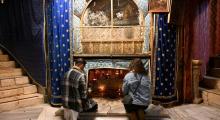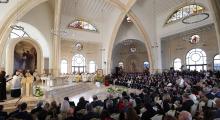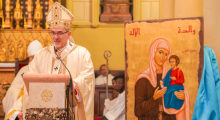Issued by the Catholic Center for Studies and Media - Jordan. Editor-in-chief Fr. Rif'at Bader - موقع أبونا abouna.org

Following is the text of the meditation by Latin Patriarch of Jerusalem His Beatitude Pierbattista Pizzaballa for the First Sunday of Advent, year C, November 28, 2021:
This Sunday starts a new liturgical year, when the Gospel of Luke will accompany us on our path of knowledge of the Lord and growth in faith.
In this year we will live all the mysteries of Christ’s life, because year after year, His life always calls for more room in the us, so that it becomes increasingly our life; and, like every year, our journey begins with the time of Advent, a time when, step by step, we approach the encounter with the Lord Who manifests Himself in the flesh.
It’s an event that God Himself prepared over the centuries: and we enter in this lengthy preparation.
The text we listen to on this day is taken from Chapter 21 of the Gospel of Luke, a section that directly precedes the account of the Passion; like the other synoptic Gospels, so also Luke, at this point, prior to the Passion narrative, gives an “eschatological” speech, or a reflection of Jesus on the last times, on the return of the Lord. And this to say that really the Paschal Mystery is the true light with which to view the meaning of history.
The text is divided in two parts, and from each of the two parts, we derive some food for thought.
In the first (Luke 21:25-28), we can see with a certain clarity the path of human history. What is this way? It consists of two elements.
There is primarily a time of disruption, fear, sorrow. We could say that this time is no different from the ordinary life of people, oftentimes made so by this distressing reality. It’s the time of life as a trial, temporary in nature, of choices to make and unfinished initiatives to conclude, a time of transformation.
But the important thing, which Jesus says, is that this history continues to an end; we could say that history is a womb, which has in itself that to which it tends and for which it is made. History is not on its way out, near the obliteration of everything; it’s not near chaos or death; history moves in the direction of encountering the Lord. This is great news that today’s Gospel gives us: The Lord is coming (Luke 21:27). While history moves towards an end, the Lord comes to encounter us, and enters history.
In the second part of the Gospel passage, we are given to understand that this coming of the Lord will be perceived and experienced in different ways: for some it will be like a trap (Luke 21:35), for others a liberation (Luke 21:28).
The trap is something that come suddenly to you: for some the coming of the Lord will be like an unexpected event that happens while you were not really expecting it, because you were occupied by something else. Like something that you had no idea could happen.
This is to indicate that there is the possibility of living an entire life without knowing that this life has meaning because one day it will meet the Lord, not knowing this encounter as something that’s already happened, that’s renewed every day. Not knowing that one day such a meeting will be fulfilled in a definitive way, and that fulfillment will not be anything other than what one has lived day to day: an encounter with the Lord.
If this encounter doesn’t happen, then it’s not surprising that life is weighed down with squandering, drunkenness, troubles (Luke 21:34): it’s the situation of those who have no other reference for their lives, except the present moment, and must find a thousand ways to fill a void, to escape loneliness. It’s the situation of the person who’s never been, in his/her life, “in the presence of the Son of man” (Luke 21:36) and, in the end, won’t be sure what he will learn to do with his life; because life is given to us just to learn this art, that of being with the Lord.
For others, instead, the coming of the Lord will be a liberation, the final liberation from loneliness. It will be the time when humans will see that salvation in which they believed and in which they placed their hope is truly fulfilled and completes everything about life.
What makes the difference between the two different outcomes of human existence will not be so much the result of a moral matter, from observance of the law, from a personal perfection. It will result from an ability to be vigilant (Luke 21:34.36), rather from that way of being in the world of those who know that this world is not everything and awaits another. It is the attitude of those who remain open, whose life is not filled, who always leave a free place inside themselves to be able to be amazed, to receive. And it is the attitude of the those who expect a newness, and experience everything by knowing that just there newness begins.
Next to vigilance, Jesus refers to prayer (Luke 21:35): one watches only by praying, and unless one prays, he falls asleep, like the apostles in Gethsemane. Because prayer is the real opportunity of living life without escaping, without getting lost when faced with complexity or pain.
We’ve often thought of prayer as a way to change existence, like an alternative and a little magical world wherein to take refuge when life was becoming too hard.
Actually, prayer is exactly the opposite, it is to draw from the strength the Lord to stay within what happens, knowing that we are not alone. And that everything will be faint, except that presence.
+ Pierbattista
 Jerusalem: Augusta Victoria Hospital offers free treatment for Gaza children diagnosed with leukemia
Jerusalem: Augusta Victoria Hospital offers free treatment for Gaza children diagnosed with leukemia  Text of meditation by Cardinal Pizzaballa, Latin Patriarch of Jerusalem, for second Sunday of Christmas
Text of meditation by Cardinal Pizzaballa, Latin Patriarch of Jerusalem, for second Sunday of Christmas 




